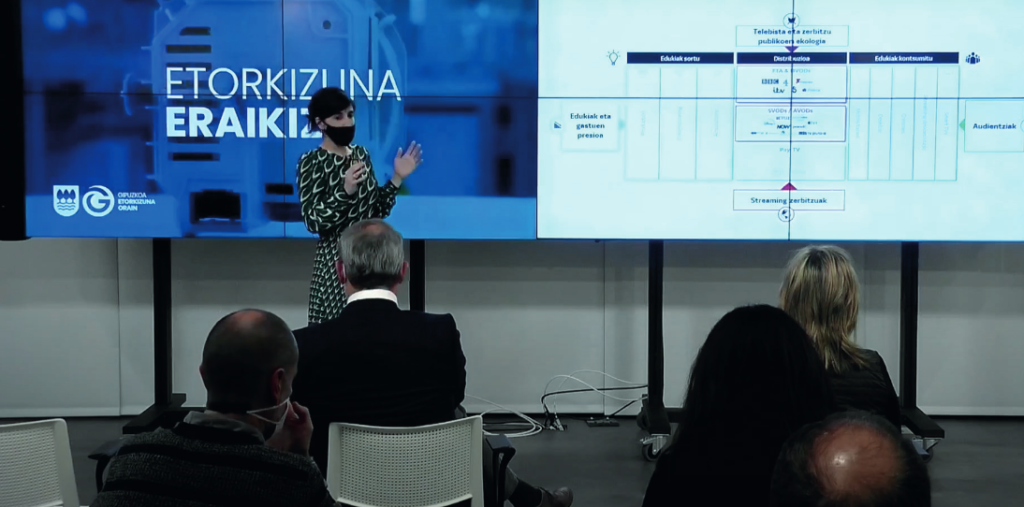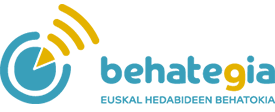We need a strategy as a people and we need it immediately.
This follows from the intervention of Garazi Goia in San Sebastian on December 22 (Foro Gipuzkoa berdinago, organized by the Provincial Council of Gipuzkoa), under the title “The audiovisual, a global view towards the Basque Country”.
The secure telecommunications engineer has been working for almost half a lifetime in the UK, on the BBC and now on SKY. SKY is the largest audiovisual company in Europe, with 23 million partners. In recent years Goia has accumulated important knowledge in this field, occupying positions of responsibility in the area of strategy and innovation.
His discourse is based on a global vision in which corporations that are the main producers of audiovisual content worldwide exert strong pressure among them, which prevents them from walking alone. Proof of this is the concentration that has taken place over the last five or six years through strategic partnership agreements or mutual tragedies. The most significant convergences occurred among the following producers of 90% of the global market content: AT&T and Warner Bros in 2016; Comcast, Universal, NBC and SKY in use; Viacom and CBS in particular, and Disney and FOX in 2019; Discovery, Warner Media and HBO 2020; and Amazon and Anunci-Goldwyn-May2021.
This trend also affects Euskal Herria, which is increasingly reaching us. Goia is of the opinion that the absence of these large companies to develop local, European-cut production (if you want a niche) is positive. Let us not say, to develop even more local production, one of the only ways of constructive competition in the face of the world situation.

In the region best known by Garazi Goia in the UK, it is clear how Netflix and Amazon Prime are emerging between the platforms and down BBC and Channel 4. Although in every household they had the habit of having three or four platforms, recently two are chosen; Netflix, Amazon Prime, Disney and Apple are the most chosen (this quarter less). This competition is being very tough and expects all these trends to reach Euskal Herria within two years.
In 2022, it will be a milestone in the United Kingdom: for the first time, less than 50% of the time viewers spend in front of the screen will be the past in front of traditional television for the benefit of other media, which represents a significant change in people’s consumption patterns. The Director of the BBC, for example, acknowledges that they need a major transformation, that they cannot compete with it and that they must therefore assume a greater creative risk, gaining greater commitment to diversity, underlining differentiation and strengthening the link with the brand of the public, noting that if it is not a clear strategy the future of the BBC is very dark. Public channels like CH4 and iTV are also looking for this differentiation. According to Goia, given the strength of the public system in Euskal Herria, it is important to observe what is happening in the United Kingdom, based on the difficulty that the enormous platforms have to reflect their culture and character. But this requires regulation, policy modification, the promotion of new funding models, etc.
If we look at the audience habits of that geographically well-known area, Goa focuses its attention on this age group between 16 and 34, where future foundations are laid. According to the 2020 data, the average daily consumption of audio-visual is five hours. Only 32% of this time corresponds to traditional television (programming grid and à la carte services), the rest to platforms with a significant upward trend such as Youtube, video games and new communities (Twitch, Tik Tok, etc.) form
In view of this reality, the rapporteur has approached the Basque Country and warned us that we must now begin to define what kind of audiovisual ecosystem we want in five years’ time. And then he makes proposals.
The strong competition between the platforms mentioned above leaves two outlets to continue growing, raising the quota to viewers or expanding to other territories. This expansion leaves little room for diversity and needs to be exploited with the help of legislation.
Moreover, public services need to be redefined and transformed by focusing on cooperation, knowledge and new forms of work (modelled on the above mentioned BBC reflection).
The audience trends are similar to those seen earlier in Euskal Herria and these should be really measured and understood to know what viewers want.
A coherent strategy that integrates all these criteria and takes into account the whole framework is needed. There are no silver bullets, as Goia said using the English expression; the solution is not unique, but we must work the whole with a comprehensive strategic vision.
It lists the main elements that influence this reflection, such as the viewer"s experience when facing the screen, the personalization in content selection and the differentiation as reinforcement of the connection with the viewer.
Netflix, for example, has a lot of work done on the viewer’s experience to quickly start what they want to see since they sit on the platform, with the “Netflix” button on the remote control of television sets, which has also started making Amazon Prime. This platform also has 8,000 people dedicated to personalisation with the public, which accounts for one third of the total workforce.
This competition between platforms goes very fast and is very violent. Who comes out victorious? For he who manages to cross the “fourth wall”, the greater connection and closeness to the audience. In this sense, in Euskal Herria we can be at the center of the community, language, culture... to achieve this closeness. Goia repeats, if there is room for diversity among large companies. In Wales or New Zealand, for example, the concept of community has already been used to seek that proximity. If it is not clear, it says again: time is moving forward and we need a coherent strategy, if they will not eat us.
He ends his speech with a number of recommendations. For Goia, we have to decide what game we"re in and limit ourselves to, we can"t go to a broad context. A positioning is needed to define what we want to achieve. If the horizon is 2030, say, what will be the parameters of the audiovisual ecosystem that the Basque country will have at its heart? We must develop on three axes, what we are going to do, why we are going to do it and how we are going to do it. Why? Because we must protect our language, our identity and our culture. How do you do it? Transformation, new ways of working, transformation and cooperation are key to achieving common goals, always putting Euskera at the centre. What to do? To achieve an optimal audiovisual context in 2030 in Euskal Herria. One of the tasks is to measure the relationship between the media and the audience. How does EITB do it? In SKY, for example, there are personnel specialized in measuring 30 parameters every day and make the investment, the effort, in this direction, depending on those measured parameters that influence. Let us start by considering five Basque parameters, for example, and analyzing them as a whole, not individually. Being aware that this cannot be measured does not serve us, we must go and measure the impact.
To conclude, Garazi Goia remembers and revives the need for our strategic vision as a people, if we do not, they will do us.
Audiovisual, a global view from the Basque Country. To watch Garazi Goia's conference:
youtube.com/watch?v=ae IixX0g2z0


